Reverse Gold Digging?
Househusband As An Occupation
Sid Scott
The University of Memphis
Spring 1996
This research paper is a partial requirement
for the completion of Econ 4920 Senior Seminar under the supervision of
Dr. K. K. Fung
A few decades ago, the man's role of providing and supporting the family was one of women's prime
consideration in determining what man she was going to marry. Recently, more and more
women are entering into high paying fields. Because of this, one might
think that women would seek househusbands. Currently, this is not occurring.
One reason for this is that men have nothing to offer females in exchange
for their salary. When males begin to specialize, they will be able to
offer females something for their income. Until males realize this, there
will be very few househusbands.
Motivation
One would think that with more women obtaining high paying jobs, that more men would "marry up" or even become househusbands. The fact is that this not occurring.
More and more women are entering careers that are high paying than ever before. Forty-three percent of new lawyers and thirty-eight percent of new doctors are women. (Review of Legal Education, 1992; Association of American Medical Colleges, 1994) Women are also more educated in the 1990's than they were in the 1970's. In 1970, only eight percent of females above the age of twenty-five were college graduates. In 1991, the number of female college graduates rose to 20%. (Digest of Education Statistics, 1992)
A survey of 902 women who graduated from Harvard University was conducted, and the outcome provided very interesting results. The women that participated in the survey had graduated from the university's medical, law, and business schools between 1971 and 1981. All of the women in the survey had at least one child. Out of these women, 70% said that they had reduced their hours of paying work because of their children. Over 50% reported to have changed jobs to accommodate their child care responsibilities. Nearly 40% claimed that parenting had slowed their career advancement. Out of all the women who were surveyed, only one had a househusband. (Swiss and Walker, 1993)
The fact that only one woman had a househusband was very interesting. One would think that female doctors, lawyers, and other top professional women who had graduated from Harvard might have househusbands.
There is one underlying reason why this trend is not occurring. In the market of males, very few men can offer the higher earning females anything in exchange for the female's earning.
The root of the problem begins in early childhood and the teenage years. The division of labor that exists in the home causes girls to do more of the traditional homemaker duties. Because of this, males have nothing to offer high salaried females to become househusbands.
More househusbands would exist if males specialized in household duties. At this time, high-earning females have no incentive to marry a man who does not work because he is viewed as a free rider.
This paper has two parts.
The first part will examine reasons why males are not qualified to be
househusbands.
Secondly, the home specialization model is going to be used to show what
males have to offer to high earning females to become househusbands.
Comparative Advantage
and Specialization
Under the theory of comparative advantage, a high earning female can be better off by marrying a male who is a househusband. The female is better off because she becomes more productive and advances in her occupation because she becomes more efficient at her job. This is true because the female is able to spend more time at her job instead of completing household duties.
A househusband is also better off under the theory of comparative advantage. This is true even though he may or may not be as efficient as the wife in household duties. The househusband gains because he gets to spend time with his children and is able to work in a relaxed atmosphere. Also he is better off because he is able to spend more time with his wife when she gets home from work. Lastly, the male benefits from high security from his high salaried wife.
A woman in a high paying career basically has two choices in determining who to marry. First, a woman can marry a male who makes the same amount or even less than her. When this occurs, the female can either pay someone to take care of the house or she can take care of the household chores. With either one of these choices, no specialization takes place in the family. This is because under the first option, someone else outside the family is taking care of the house and under the second option, the female is performing the housework but she may not be very efficient because she does not have a lot of time to specialize.
A second choice a high earning female has is to marry a male who has specialization skills in household duties. When a male specializes, he is able to conserve a great deal of wasted time because he becomes very efficient in each chore.
Now when the female comes home, the house is clean, the baby is taken care of, and the clothes are clean. Because of specialization, the male can have all the household chores taken care of so the family can spend quality time together when the female comes home from work.
This time that is saved from a male specializing in household chores is very important after a child is born. Time becomes very scarce after a child is born.
As stated earlier, more and more females are entering the work force. Because of this, females opportunity costs are high if they stay at home and take on the responsibility of being the traditional "housewife." This is just the opposite for males. Now that more females are taking over traditional male dominated fields, the opportunity costs of a male is not as high as a female if he stays at home.
The theory of comparative advantage shows how specialization from a male can increase his attractiveness to a high earning female. Tradeoffs can be beneficial even if one of them is more efficient than the other.
An example of this is a high earning female that is very efficient in raising children, cleaning the house, and doing other household duties. The problem that exists in this situation is the female may have a great deal of opportunity costs by spending more time at home. The opportunity costs that are lost is her high salary.
The graphs below show how specialization benefits the family as a whole.

To make this illustration simple, I am going to assume that individuals allocate their energy for two purposes, home production and market production. Each extreme (H 1 , H 2 , M 1 , M 2 ), represents the individuals maximum production potential.
Graph one represents the husband and the wife. According to the models, if the husband specializes in only housework (H 1 ), he can accomplish 90 units of work. If he specializes in only an occupation, he can accomplish 25 units of production (M 1 ). On the other hand, if the wife specializes in housework, she can accomplish 90 units of production (H 2 ). If she only specializes in her occupation, she can accomplish 150 units (M 2 ).
In a marriage where both the husband and wife works, neither one can ever achieve their highest potential of production. This is true because each one will have to work on both home production and market production. When this occurs, no specialization exists.
Even if a female has a high paying job and has a husband that works,
the female suffers. This is because when the wife does housework, her
opportunity
costs are greater than her husband's. This is shown in graph one. For every
unit of extra energy put into housework, the wife has to give up 1.67 units
of productivity in her occupation. On the other hand, every unit of extra
energy put into housework, the husband has to give up .28 of a unit of
production in his occupation. Ultimately, if a female has a high paying
career she has greater opportunity costs than her husband if she has to
do housework.
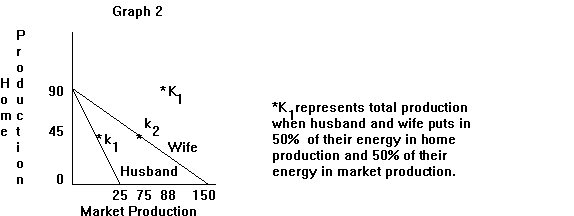
Graph two represents a situation where complete specialization does not exist. The husband contributes 50% of his energy toward home production and 50% of his energy toward market production. Likewise, the wife contributes 50% of her energy toward home production and 50% of her energy toward market production. In this situation, total production equals 90 units in home production (45 units + 45 units)and 88 units in market production (12.5 units + 75 units).
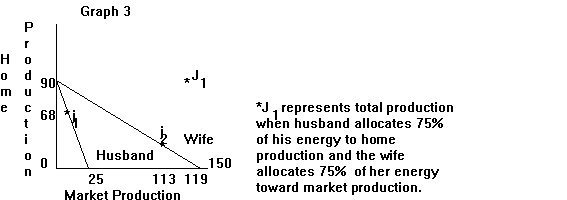
Graph three also represents
a situation where complete specialization does not exist. In this situation,
the husband contributes 75% of his energy toward home production and 25%
of his energy toward market production. The wife contributes 25% of her
energy toward home production and 75% of her energy toward market production.
Total production in this situation equals 90 units in home production (67.5
+ 22.5) and 119 units of market production (6.25 + 112.5).
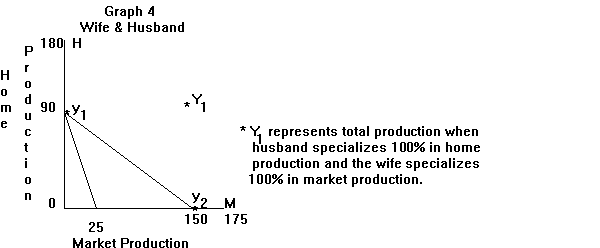
Graph four represents the situation when the husband and wife specialize in either home production or market production. At point M, both the husband and wife specialize entirely in market production, producing 175 units of production. At point H, both the husband and wife specialize entirely in home production, producing 180 units of production. Point Y 1 shows where a househusband specializes in only housework and the wife specializes only in her occupation. The total production is maximized at the point (Y 1 ) where the husband allocates 100% of his energy toward housework and the wife allocates 100% of her energy toward her occupation. The total production that occurs is 90 units of home production (y 1 ) and 150 units of market production (y 2 )
If a female marries a husband who has specialization skills in household duties she will be better as will the family as a whole. This holds true because the total amount of production increases. Now the female can specialize in her occupation. This will cause her efficiencies to rise. Secondly, the efficiency of the male rises because he is able to specialize in household chores. Because of this specialization from the male, all of the household chores get accomplished without interaction from the female.
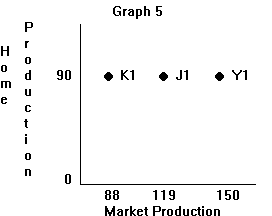
Graph five shows how specialization
is more productive than partial specialization. The production in the home
was all the same because in the example, both the husband and wife were
just as efficient as the other so the total production always equaled 90.
The market production greatly increase under specialization. When the wife
could devote 100% of her energy toward market production (Y
1
),
the overall production of the family increased over the other two examples.
This proves that if specialization exists in a family, the family will
become overall more productive.
Lack of Househusbands
One of the reasons why high earning females do not have househusbands is because not many men are qualified to be househusbands. This is a result of the division of labor that existed in the family that the male was raised in.
A quote by Oscar Wilde clearly identifies this, "All women become like their mothers. That is their tragedy. No man does. That's his." Men and women in the work force have basically come from traditional families. Females specialize in housework because their mothers did. Males do not because their fathers did not specialize in housework.
At an early age, the sexual division of labor is much different between boys and girls. Girls grow up expecting to specialize in child care. Boys grow up expecting to specialize in warfare and deep-sea fishing, emetic rituals, or paying work in the market. (Mahony, 1995) This can be seen from jobs that teenagers hold. Teenage girls tend to have baby-sitting jobs after school and on the weekends, teenage boys do not. Because of this, girls learn how to care for children while boys are learning traditional masculine roles. Teenage girls tend to do more housework than boys. Girls, on the average, do three-quarters of the dishwashing, laundry, cooking, and cleaning. Teenage boys, on the other hand, tend to do yard work. (Goldschieder and Waite, 1991)
In 1982, a large survey of high school students was done. According to this survey, young men seem to not be learning househusband duties. Table one shows the results. (Digest of Education Statistics, 1992)
Table 1
| Male | Female | |
| Having children is nt | 37% | 42% |
| Having money is important | 41% | 24% |
This seems to show that males
want to work and earn a great deal of money. As a househusband, he would
not be earning a paid salary. Secondly, child raising is a specialty that
is required by a houseparent. According to the survey, the majority of
males are not interested in children.
Househusband and Specialization
There is a market for househusbands. This can be seen from a survey done of 40 females who are in medical school. The questions asked were: Do you want to marry a male making about the same money as you, and why? The results are shown in table two.
Table 2
| YES | NO | |
| Do you want to marry a man with same earnings? | 80% | 20% |
| Why? | |
| Higher total income | 5% |
| Person to fall back | 67.5% |
| Other | 27.5% |
On the surface, one might think there is not a market for househusbands because of the high percentage of females who want a male with the same earnings. For that to be true, they have to not take account of the second question. The two reasons why they wanted a same-earning income husband was for childbearing and other various reasons. If a man was to specialize in child raising, this fact would be different.
A survey was conducted on
the University of Tennessee Medical School to support the proof that women
approve of househusbands. This survey consisted of thirty randomly selected
females. One of the questions asked was, would you respect a man that was
a househusband? The results that were formulated in graph six show that
women have a favorable view toward househusbands.
Graph 6

In the Harvard survey, 70% of the women had to quit or reduce their work load because of children. Over 50% had to change jobs to accommodate child care responsibilities. (Swiss and Walker, 1993)
A househusband must have
certain skills that he can offer a female in exchange for the salary that
she makes. Because the wife provides income for the family, she will require
the husband to specialize in housework. Another question that was asked
to female medical students at the University of Tennessee Medical School
dealt with specialization skills. The question asked for the top three
skills that females looked for in a househusband. Graph seven shows the
percentage of respondents that would require a particular specialization
skill for a male to be qualified as a househusband.
Graph 7
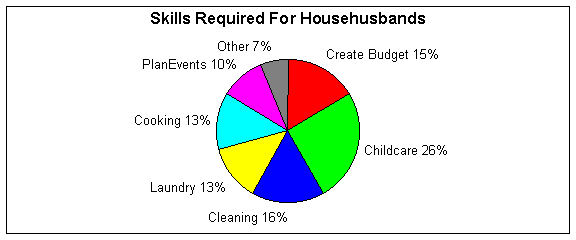
A male gains a comparative advantage with a female if he specializes in child care. This might be true if a female is in a high paying position that she enjoys. The trade off occurs with care in the home for the child from the husband and income security from the wife.
Childcare specialization greatly increases a male's potential to become a househusband. Women have a head start effect over men in regards to their children. Some research suggests that mothers on the average are more attached to their newborns than the fathers. (Zeanah, 1989) Because of this, females in general are less likely to re-enter the work force quickly after childbirth. With a man who has specialization in childcare, the wife is able to return to work very quickly.
As stated earlier, with the head start effect, mothers have a great deal more attachment to their younger children. Because of this, a mother would gain from a husband who specializes in child care. The mother might not want a stranger to care for her child. With her husband caring for the child, her satisfaction is greater because she knows that her child will not be with a stranger and receives quality care.
Males must also specialize in other household duties to become more attractive to high earning females. College experience increases a male's degree of specialization. Males tend to develop more flexible views on who should do chores in the home. (Goldscheider and Waite, 1991) When males live away from home while they are in college, the sexual division of labor changes. (Mahony, 1995)
If males specialize in household
duties, they develop a comparative advantage with high earning females.
Females might view a male without these skills as a free rider.
Conclusion
Gains from specialization are very valuable. A wife gains from a husband who specializes in being a househusband as well as the househusband gaining from the wife. A great deal of time is saved from this specialization.
The theory of specialization and comparative advantage both show that if males specialize in certain household skills, more females might seek out househusbands. At this time, high-earning females have not incentive to marry a male who does not work because he has nothing to offer her.
If a male wishes to become a househusband, he must specialize. He will benefit from having a non-stressful role in life as well as having security. A high earning female will benefit from having extra time because all of the housework is done.
Survey Target: Females With High Future Income
1. Would you respect a househusband?
a. Yes
b. No
2. List top three skills that you believe a househusband should specialize
in? (Ex. Ironing, Cleaning, Etc.)
____________________________________
____________________________________
____________________________________
Works Cited
After the first couple days of Senior Seminar, I discovered that I had a great deal of freedom to choose my topic. I discovered that Dr. Fung's approach was very different than every professor that I had before. The reason was because I was not restricted to the same old boring economic research that I became accustomed to. Also, I was going to have to be disciplined and to complete work. I knew that I would get into trouble if I didn't work at a steady pace.
Practically the entire first month I had trouble in narrowing down a topic that would be interesting and manageable. Some of the topics that I thought would be interesting, I found out through Dr. Fung's criticism might be boring and unmanageable.
My first topic choice had to deal with reforming the current welfare system. My proposal was how government run stores might cut down on the amount of fraud that exists with handing out food stamps. Soon I discovered that this topic was to boring and would be very hard to do research on because not much data was published.
My second choice came soon after my first. I finally thought I had a topic. This please me because class had already been in session for about a month and a half. The topic dealt with how increased incarcerations might benefit the economy. Dr. Fung was also very critical of this topic. I realized he was right though when he discussed how much prisons cost. My initial scope of the topic was very limited and one tracked. I really started to feel troubled after the second denial. I really began wondering if I could decide on a topic or not.
The next couple of weeks, I never thought I would be able to find a topic. At the beginning of class I thought that doing this would be very easy. After hearing Dr. Fung discuss many of the topics brought up, I discovered that they were all boring. I caught myself on many occasions thinking about nearly everything and wondering if that would be a good topic or not.
One day during class about a week before Spring Break, Dr. Fung gave me a brilliant idea. He was talking about how males should hang around medical schools to find a wife. I then decided that I wanted to do my research on the economic gains that a male would receive by marrying a female doctor or any other high salaried female.
I began working on Nexis-Lexis running into many dead ends. I thought that I was going to have to change my topic because of lack of information. I also lost my temper a couple of times at the computer terminal when no findings came up.
The next day, I went to Dr. Fung's office and discussed the matter with him. In just a few minutes I was supplied with three articles dealing with the subject. After getting this material I knew I was on the way to finishing this paper.
During Spring Break I still had a lot of trouble on the topic. By the time I got back to class I realized that I had not accomplished much during my vacation. My thoughts went back again wondering if I had chosen the right topic or not.
One of the articles, that Dr. Fung gave to me was actually a review of a book titled, Kidding Ourselves . According to the review, the book dealt with the economic inequality of women. The library at the University of Memphis did not have the book as well as the Memphis Public Library. The first couple of bookstores I called did not carry the book and they told me that they could not order it. Finally after about the fifth store I called, I was told that they could order it.
About two and a half weeks after Spring Break Jeff brought me a list of articles that he found on the internet that he thought could help me with my research. The articles were actually abstracts of other articles. I wrote to Ted Bergstrom that was the author of these abstracts on the internet. He is a professor of Economics at the University of Michigan.
I was pleased that he responded back to me within a week. He told me that he did not have anything on the subject that I wanted, but he told me to contact Maria Cancian at Stanford University. I wrote to her and she had two articles that she had written that she felt might help me. I told her I really needed them because them semester was getting close to being through. She sent them Fed Ex and I got them within two days.
By this time, I had already read Kidding Ourselves From this book, I got a lot of interesting facts.
When I actually got my first draft completed, there were only about three weeks of class left. Half the semester was spent finding a topic and basically the other half was spent gathering data. I turned in my draft and got back very negative responses from Dr. Fung.
I came to realize that I had drifted away from my topic when I wrote my first draft. I was suppose to be writing on why no househusbands exist and the things they need to do to attract high earning females. My entire paper was why babies caused women to cut back or even quit their jobs in a marriage because they are not economically equal with males.
The next day I went back to the drawing board. I thought that the entire world had come to an end. Soon I discovered that I had much of the information in front of me. I just had put together the wrong things. I then began to think that much of my researching work was finished.
Within a week I was able to submit a new draft. Dr. Fung seemed pleased because he told me it was a complete turnaround. He still said it needed a lot of work.
I continued to work on the paper attempting to improve it. Dr. Fung gave me a suggestion on interviewing females and asked them if they would respect a househusband. Also he told me I needed to find out from females what skills would they require in a househusband.
For two days, I went around campus getting females to take my survey. After I put my findings in my research, Dr. Fung told me that he felt that the people I interviewed were not really the people I should have surveyed. He told me that my research might not be correct because many of the females surveyed do not have high income potentials.
I decided to trash my entire results. That night, I went to the UT Medical School and used the same survey. I had to go back the next morning to finish my surveys. I discovered that around the same percent felt as though househusbands were respectable but they had different views on the skills that males should have to be househusbands.
I discovered that the females at UT Medical School were very favorable on having a househusband. I thought about hanging out around the medical school more and try to find a wife.
Now with only about a week left I got my research back with Dr. Fung's comments. He thinks that I need to work on my conceptual framework more because it is weak.
I am so glad now that I've got this research turned in. For a while I didn't think I was going to get it done in time.
From this research I've gained some valuable information. First my eyes have been opened more with things that I never thought economics dealt with. This was acquired though all of the discussion in class. I learned that basically anything can be viewed from an economic point of view.
Secondly, I think I've realized that procrastination is not the thing to do. The semester long research has taught me how to plan more. Even though I did procrastinate some, I think I might have not done it as much as some people in the class. This will help me in the business world when I have a project due at a certain time in the future.
Lastly I've learned that asking people who are more specialized than me can help a lot. Dr. Fung probably got tired of seeing me so many times. When I did something wrong, Dr. Fung corrected me and I learned from my mistakes.